PRESIDENT KENNEDY BREAKS GROUND
FOR U.S. PAVILION
Signals start of work at site
on $17 million Federal Exhibit
-
President
Kennedy, as he spoke at groundbreaking ceremonies for the U.S.
Pavilion at the New York World's Fair. Seated behind him are
Robert Moses, president of the Fair, and New York City's Mayor,
Robert F. Wagner.
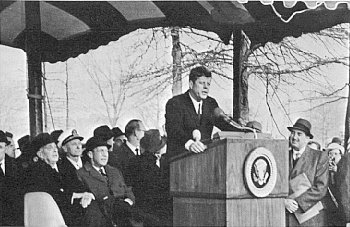 |
|
|
Last Friday, December 14th, the
Fair was host to President John F. Kennedy who addressed a large
crowd before signaling the start of construction for the United
States Pavilion. Participating in the official ceremonies with
the President, who had been invited to the Fair by Thomas J.
Deegan, chairman of the executive committee, were Robert Moses,
president of the Fair, Mayor Robert F. Wagner and Norman K. Winston,
United States Commissioner for the Federal exhibit.
Arriving shortly before 1:00
p.m. at Idlewild Airport, the President was greeted by Mayor
Wagner. The official party, including 30 members of the White
House press, then proceeded to the Fair's Administration Building.
After a short briefing on World's
Fair progress by General William Whipple, Jr., Fair chief engineer,
in the model room with a press pool in attendance, the group
moved directly to the 196,394 sq. ft. United States Pavilion
site in the Federal and States Area. Here other members of the
press, the executive committee and visiting public had gathered
for the event.
Mr. Winston presided over a fifteen-minute
ceremony during which he described the Federal Pavilion as "an
expression of the American spirit." Mayor Wagner said the
groundbreaking for the United States exhibit "marked another
milestone on the way to the realization of what was expected
to be one of the greatest world expositions ever held."
|
The President expressed appreciation
to Robert Moses, Mayor Wagner and all those who are working on
the Fair to make it a success. Describing the theme as "most
appropriate," the President said he thought the 646-acre
Fair would show visitors from abroad, "what kind of people
we are, what kind of country we have and what the land is like."
Mr. Moses in thanking the President
said, "We are elated, Mr. President, that you have come
personally to inaugurate the Federal exhibit of the World's Fair,
and thus again to demonstrate dramatically your wholehearted
support of this olympics of progress." Mr. Moses presented
the President with the first gold commemorative medallion.
The event was climaxed by President
Kennedy as he signaled the first bulldozer into action.
The briefing in the model room
and the on-site ceremony were held to a little more than a half-hour
because of the President's heavy schedule.
Renderings and a description
of the $17,000,000 United States Pavilion will be released at
a later date. Charles Luckman Associates of New York are architects
for the project. Del Webb, West Coast builder, will be in charge
of construction.
|
Source: FAIR NEWS,
Vol. 1, No. 7, December 20, 1962
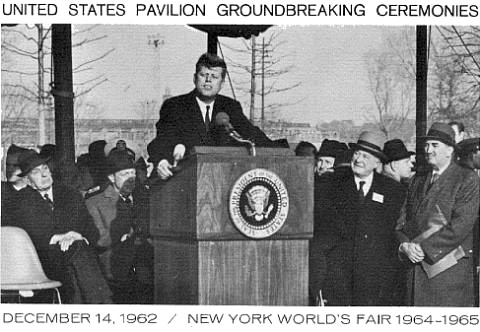
|
FOLLOWING IS THE TRANSCRIPTION
OF REMARKS BY PRESIDENT KENNEDY, U.S. COMMISSIONER NORMAN K.
WINSTON, ROBERT MOSES AND MAYOR ROBERT F. WAGNER AT THE OFFICIAL
GROUNDBREAKING CEREMONIES FOR THE UNITED STATES PAVILION, NEW
YORK WORLD'S FAIR, FRIDAY, DECEMBER 14, 1962.
COMMISSIONER NORMAN K. WINSTON
[United States Commissioner for the New York World's Fair]: Mr.
President, Mr. Mayor, Mr. Moses, ladies and gentlemen. This is
an important day for the American people. We are erecting here
more than a building, more than an exhibition. The Federal Pavilion
will be an expression of the American spirit. It will illustrate
the basic character that has enabled our people to meet past
challenges. And under the dynamic leadership of President Kennedy,
it ensures our meeting these problems which face us now.
As United States Commissioner,
let me add that I have a deep appreciation of our mission here.
We are certain that the monumental structure that is to be raised
on this site and the exhibits it will contain will provide an
unforgettable experience
|
for millions of people from all
over the world. We
hope and expect that the pavilion will effectively and dramatically
portray America's achievements.
The keystone in this gigantic
enterprise is himself a symbol of a half-century of patient and
constructive public service. The president of the World's Fair
-- the Honorable Robert Moses.
ROBERT MOSES: We are delighted,
Mr. President, that you have come personally to inaugurate the
central exhibit of the World's Fair. And thus again to demonstrate
dramatically your wholehearted support of this Olympics of Progress
and to help us celebrate the 300th anniversary of a great city
which has so long been a haven of hope and a bastion of freedom
to the adventurous and oppressed of every land.
We are in the midst of giant
preparations, which to a trained eye, represent much more than
volcanic disturbance of the landscape and rude interference with
travel. Grover Whalen found long ago that it takes a certain
amount of chaos to make a Fair. Shills as well as shovels are
needed, and I speak for the shovelers.
|
U.S. Commissioner
Norman K. Winston introduces President Kennedy as New York World's
Fair President Robert Moses and members of the Fair's executive
committee look on.
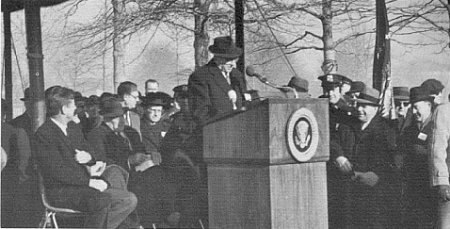 |
|
|
The breaking of ground for this
pavilion is no childish prank. It marks the rising crescendo
of construction and the beginning of order and harmony. Those
who do the building are neither phrasemakers nor amateurs. We
have roamed these United States and literally combed the globe
for pavilions and exhibits which will reflect the achievements
of all men in industry, culture, the arts and harmless entertainment.
We confidently expect more than seventy million visitors to an
unforgettable pageant.
We want you to come again in
1964 to open this exposition, further emphasizing your leadership
in world affairs, and your confidence in peaceful assembly and
healthy rivalry among the nations. Your presence here today heartens
all of us, toughens our hides, and speeds our efforts to a dramatic
conclusion.
May I, in conclusion, present
to you this gold medallion from the directors of the Fair.
COMMISSIONER WINSTON: The next
speaker, so well and favorably known to you all, is the chief
executive of the City of New York. The Honorable Robert F. Wagner.
ROBERT WAGNER: Mr. President,
Mr. Winston, Mr. Moses, ladies and gentlemen. Today we mark another
milestone on the way to the realization of the
|
promise of the World's Fair.
As new York City is the greatest city in the world, we fondly
hope and expect that this will be the greatest World's Fair ever
to be held any place, under any flag.
We of New York City are going
to do all we can to help make it so, and I know that Bob Moses
and his great team are dedicated to making it so. Today we dedicate
the Federal pavilion, the House of America at this World's Fair.
We are breaking ground for one of the most meaningful of all
the exhibits which will be featured at this Fair. It is estimated
that more than seventy million people will pass by here. I trust
and hope that all of those seventy million will visit the Federal
Pavilion. We may hope that of those millions, those from abroad
will be able through this pavilion to understand America better,
and that those from America will be enabled to understand their
own country better.
This Fair will be memorable in
the history of this country. For many people it will doubtless
be the best remember feature of the seventh decade of this century.
1964 will be the 300th anniversary of the yielding of the city
of New Amsterdam to the besieging forces of the British Duke
of York, and the consequent naming of the City of New York. In
1964 the World's Fair will make this 300th anniversary and this
Federal Pavilion will illuminate the
|
Attending the briefing
session on arterial highway and exhibitor construction progress
are Norman K. Winsston, U.S. Commissioner for the Federal Pavilion,
Mayor Robert F. Wagner, President Kennedy, a member of the Presidential
party, and Fair vice president William Berns. General William
Whipple, Jr., chief engineer, briefed the President around a scale
model of the Fairgrounds which shows new highways and exhibit
buildings as they will look when the New York World's Fair opens
on Wednesday, April 22, 1964.
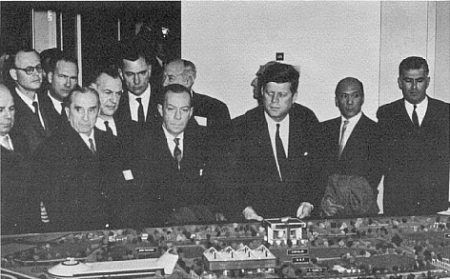 |
|
Source: Fair
Corporation Commemorative Groundbreaking Brochure
|
road that America traveled from
its beginnings to its present greatness.
We are proud indeed to have with
us on this occasion the great President of the United States.
He honors us and honors this Fair by joining with us on this
occasion. We salute him today, as the World's Fair will salute
him in 1964. We of New York City welcome you and through you,
Mr. President, we welcome the Federal exhibit to the World's
Fairgrounds. We hope that you will bring us luck -- the luck
of the Kennedys and of the United States of America. Thank you.
COMMISSIONER WINSTON: Ladies
and gentlemen, the President of the United States.
PRESIDENT KENNEDY: Mr. Mayor,
Mr. Winston, Mr. Moses, Mr. Screvane, gentlemen -- I want to
express my great appreciation to all of those of you who have
been connected with this Fair. Mr. Moses, who has been working
so hard to make it a reality; Mr. Winston, who has been working
on the American exhibit; the Mayor, who has given it his close
sponsorship since it began, and
|
all of you, particularly those
of you who are building it.
This is going to be a chance
for us in 1964 to show seventy million visitors -- not only our
countrymen here in the United States, but people from all over
the world -- what kind of a people we are. What kind of a country
we have. What our people are like, and what we have done with
our people. And what has gone in the past, and what is coming
in the future.
That is what a world's fair should
be about and the theme of this World's Fair -- Peace through
Understanding -- is most appropriate in these years of the 60's.
I want the people of the world to visit this Fair and all the
various exhibits of our American industrial companies and the
foreign companies, who are most welcome, and to come to the American
exhibit -- the exhibit of the United States -- and see what we
have accomplished through a system of freedom.
So we begin today, with this
ceremony. We'll begin again in April of 1964. And we'll show
what we have done in the past, and even more important -- what
America is going to be in the future. Thank you.
|
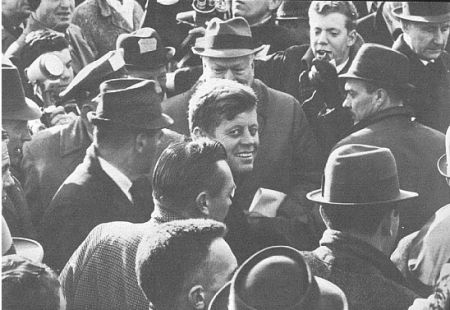 |
Construction
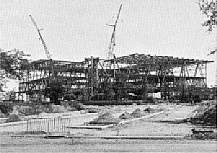 |
Ground for the massive Federal Pavilion was
broken a scant 16 months prior to the opening of the Fair. The
Fair's Progress Report #8, issued one year prior to opening,
reported that "pile drivers ... started on the 2300 piles
required for the Federal Building." Needless to say, construction
had to proceeded rapidly to make the Fair's opening! This photo
(left) from the summer of 1963 shows the steel framework nearly
complete. |
| This high altitude aerial shot (right), taken
about the same time, shows the pavilion's construction in the
summer of 1963. Both this photo and the photo above appeared
in the Fair's Progress Report #9, (September 26, 1963). |
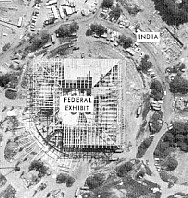 |
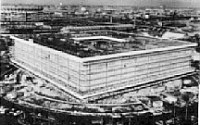 |
A photo (left), from Fair News (Vol. 2,
No. 11, December 1963), shows the construction of the Federal
Pavilion as it would have appeared in the late fall of 1963.
By this time, the steel framework was complete and the building
enclosed. A aerial view of construction (below), taken in early
1964, shows a Fairgrounds covered in snow. The vari-colored fiberglass
panels have not yet been installed on the exterior of the pavilion. |
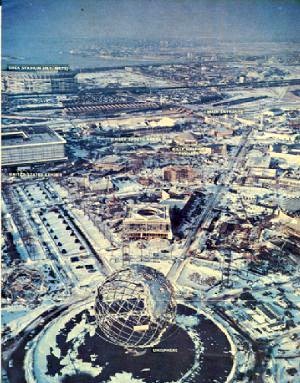 |
|

